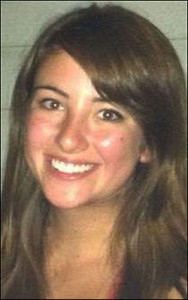Holly Hunt and Aaron Reiss Win Dean’s Award for Personality Profile
The Stories Cover Life with Alzheimer’s and Seizures
By Rebecca Dell
Columbia, Mo. (March 13, 2015) — Holly Hunt and Aaron Reiss won the Dean’s Award in the personality profile category of the Mastering the Method contest at the Missouri School of Journalism.
The contest recognizes outstanding undergraduate work in broadcast, multimedia, photography and writing. The winners of each of the 14 categories receive a $100 gift card, and their work is entered in the national Hearst Journalism Awards.

Hunt’s profile, “The Agony of Alzheimer’s,” explores the life of a man in his mid-50s whose memory is slipping away. In one part of the story, Hunt speaks directly to readers, helping them understand what Alzheimer’s is like. The story was published in Vox Magazine.
Judges’ Comments: The expressive writing, the depth of the reporting and the amount of time the reporter spent getting the story make it possible for this writer to describe the devastating effect of the illness and its effect on the person and family. She also outlines their efforts to reach out to a broader community to help the public understand the disease. It is heartwrenching.
Hunt said of her story:
Mental health has always fascinated me, not only for the science behind it but for the societal response to it. It is often an avoided topic, most likely because we fear what we don’t understand. Alzheimer’s disease is an incredibly destructive brain disease that affects millions – and will continue to do so – yet there is not enough money or research going toward it. I wanted to illuminate the disease in a way that wouldn’t allow people to look away, and to do that I needed an intimate human story. Luckily, when I reached out to the Alzheimer’s Association here in Columbia, the Cottles answered.
They graciously allowed me into their home and, after spending several days with them, into their pain. While many Alzheimer’s victims are ashamed of their illness, Brian and his family are dedicated to raising awareness of the disease by making their story known. I cannot thank them enough for their patience and willingness to work with me.
In order to write this story, I spent many hours on their couch, spoke with representatives at the Columbia Alzheimer’s Association to understand the science aspect, attended a group support session and went to Sub Shop to celebrate Amelia and Brian’s anniversary with their family and friends. I not only hope I did their heartbreaking story justice, but I hope it resonated with readers in a way they won’t forget any time soon.

Reiss’s profile, “Battle Basketball Star Plays Through Seizures,” details local high school basketball star Daviante Ostrander’s life with seizures, as well as his relationship with his basketball team and his mom. The story was published in the Columbia Missourian.
Judges’ Comments: This reporter went to great depths to understand what happened to this young basketball player. He describes the unsettling health issues the high school student faced as well as the involvement of his coach, teammates and family. It tugs at the heartstrings.
Reiss said of his entry:
I was covering a basketball game between Jefferson City High School and Battle High School when Daviante Ostrander had a seizure. The game stopped for more than 30 minutes. Some people were shocked. Some were just quiet. Pretty much no one cared about the final score.
When I came into the Missourian office a few days after that Battle-Jefferson City contest, one of the teaching assistants at the Missourian, Sean Morrison, told me to look further into Daviante’s story. I went to Battle High School and met with Daviante that week. He told me that he had no definite diagnosis for the seizures he’d had, which dated back to the summer. I began to realize then what my story was: I wanted to uncover how the seizures were affecting his life – his future in basketball and his relationships with his teammates and his mother.
Daviante was very open with videographer Tim Tai and me. He allowed us to come to his home to conduct a final interview, and it was there that I found a letter that a woman wrote to Daviante. I used that letter to open and to close my profile.
My editor at the Columbia Missourian, Greg Bowers, encourages his reporters to write about people who play sports rather than write about the sports themselves. Approaching this story with that philosophy is what allowed me to be successful.
I’d be remiss, though, if I didn’t thank Sean for his help throughout the reporting and editing process on this story. He supported my desire to take risks with my writing, but he also pulled me back in when he needed to in order to make sure I conveyed Daviante’s story the best I could.
Updated: August 4, 2020